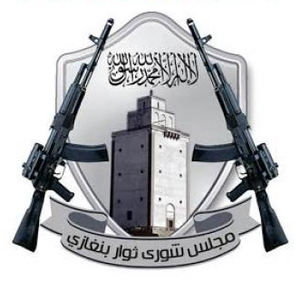The Benghazi Revolutionaries Shura Council has taken responsibility for a series of suicide bombings in and around the restive city of Benghazi yesterday that targeted forces loyal to former Libyan general Khalifa Haftar. The attacks killed dozens of Libyan soldiers at the Benina International Airport and four more in a separate attack on a checkpoint in Qubah, east of Benghazi.
Al Arabiya reported that “two cars loaded with explosives targeted a military checkpoint near Benina International Airport in Benghazi.” According to Al Jazeera, the airport houses “heavy weaponry” which the militants are fighting to obtain. Al Jazeera also claims that up to “four separate suicide attacks targeted the Benina air base.” Following the suicide bombings, heavy clashes occurred near the airport, with government airstrikes allegedly being used in defense.
This attack came hours after the Benghazi Revolutionaries Shura Council rejected a government plan for peace talks to end the violence in Libya. Middle East Monitor reports that the Council released a statement saying, “The initiative held in Ghadames [a city in western Libya], which called for political dialogue, was not based on legitimate foundations. Rather, it is a weak attempt to convince the people to surrender their rights and to allow tyrants to return to power under the guise of national reconciliation.”
This new attack by the Benghazi Revolutionaries Shura Council is the latest in a months-long campaign by Islamist forces to seize control of Benghazi.
The Benghazi Revolutionaries Shura Council is the umbrella under which Ansar al Sharia, the al Qaeda-affiliated group implicated in the 2012 Benghazi terrorist attack, and other allied groups fight. The alliance has been fighting against troops loyal to Haftar, who earlier this year launched “Operation Dignity,” an offensive to defeat jihadist forces in Benghazi.
In July, the alliance was able to overtake a Libyan special forces base in Benghazi. On its official Twitter feed (now suspended), Ansar al Sharia posted a video of its leader in Benghazi, Mohammad Ali al Zahawi, discussing his group’s “victory.” The group also posted photos of the weapons, or “booty,” it has taken into possession, as well as scenes from the assault on the base. [For more on Ansar al Sharia overtaking the base, see LWJ’s report Ansar al Sharia, allies seize Libyan special forces base in Benghazi.]
The airport is one of the few remaining bases controlled by the government in Benghazi. Ansar al Sharia has consolidated its authority in conquered territory and has enacted sharia, or Islamic law, in the areas it controls.
Ansar al Sharia is part of the al Qaeda network
A Library of Congress report from August 2012 noted that Ansar al Sharia Libya “has increasingly embodied al Qaeda’s presence in Libya.” The report also says that “it is probable that Ansar al-Sharia in Libya and in Tunisia are communicating.”
Some of Ansar al Sharia Tunisia’s most senior leaders have known al Qaeda ties, and at least two of them previously served as important al Qaeda operatives in Europe. The group’s leadership openly praises al Qaeda and the organization’s social media is littered with pro-al Qaeda messages. Ansar al Sharia Tunisia’s Twitter account, before it was suspended, was known to re-tweet official messages disseminated by al Qaeda in the Islamic Maghreb’s (AQIM) official media wing, Al Andalus Foundation. AQIM leaders have repeatedly praised and offered advice to Ansar al Sharia Tunisia. [See LWJ report, Al Qaeda and the threat in North Africa.]
The report also mentions that it is more than likely that al Qaeda in the Islamic Maghreb has made contact with Ansar al Sharia leaders. In addition, al Qaeda commander Mokhtar Belmokhtar has met with several leaders of Ansar al Sharia-allied militias in public. Belmokhtar reportedly met with Wisam Ben Hamid, who is the leader of Katiba al Ahrar Libya (Free Libya Battalion), a group the report notes is likely part of “al Qaeda’s clandestine network in Libya.” That same network is headed by al Qaeda operatives who report to al Qaeda’s senior leadership in Pakistan, including Ayman al Zawahiri.
The leaders of Ansar al Sharia are openly pro-al Qaeda and have denounced the capture of Abu Anas al Libi, a top al Qaeda operative. Sufian Ben Qumu, the leader of Ansar al Sharia forces in Derna, Libya, was a former Guantanamo Bay inmate. [See LWJ report, Ex-Gitmo detainee reportedly tied to consulate attack.]
A leaked Joint Task Force Guantanamo (JTF-GTMO) threat assessment describes Ben Qumu as an “associate” of Osama bin Laden. JTF-GTMO found that Ben Qumu worked as a driver for a company owned by bin Laden in the Sudan, fought alongside al Qaeda and the Taliban in Afghanistan, and maintained ties to several other well-known al Qaeda leaders. The US State Department added Ben Qumu to its list of Specially Designated Global Terrorists in January 2014 and said his branch of Ansar al Sharia as well as the Benghazi branch was involved in the attack on the US diplomatic compounds in Benghazi on Sept. 11, 2012. [See LWJ report, State Department designates 3 Ansar al Sharia organizations, leaders.]









1 Comment
The interesting thing that no one seems to have noticed is that the February 17 Brigade was providing security for the embassy during the 9/11 attack. The state department timeline doesn’t mention them providing any resistance to the attack, and now they’re working with AAS in the BRSC.
It seems likely that they were working with AQ even back then.